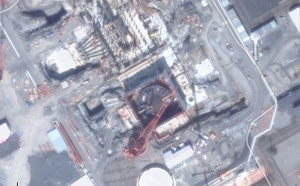
Arctic Frontiers: Disinformation, Security and the Northern Sea Route
Bellona held a seminar on countering Russian disinformation in the Arctic at the Arctic Frontiers international conference in Norway
News

Publish date: February 12, 2013
Written by: Charles Digges
News
The announcement sheds a dim light on the practicality and expense of the first-of-its kind new-generation European Pressurized reactor, which has been touted as a revolution in nuclear power production.
“This is yet another blow to the supposed nuclear renaissance,” said Bellona General Manager and nuclear physicist Nils Bøhmer. “Costly delays and billions of euro in price overruns are completely impractical, especially when compared to pursuing cheaper renewable and alternative energy sources.”
Teollisuuden Voima, (TVO), the Finnish utility for which the EPR is being built, said recent progress reports received from the plant supplier, the Areva-Siemens consortium, suggest that earlier forecasts of a 2014 start were unlikely to be met.
The delay is just one of a series of setbacks over the past years.
The original contract between TVO and Areva-Siemens signed in 2003 envisioned the plant would cost € 3.2 billion, with a completion date of 2009. TVO announced in December 2011 that it anticipated the 1600 MWe plant to begin commercial operation in August 2014, some five years later than originally planned. By that same year, the ancitipated costs of the plant had balloned to €8.5 billion, according to data released by Areva.
In July 2012, the company declared that the plant unit “will not be ready for regular electricity production in 2014.”
Noting that Areva-Siemens are constructing the 1600 MWe plant under a fixed-price turnkey contract and are therefore responsible for the time schedule of the project, it requested the supplier provide an updated schedule and completion date, World Nuclear News reported.
The giant facility, which is under construction on an island in the Baltic Sea, is forecasted to be large enough to supply 10 percent of Finland’s electricity needs.
TVO’s senior vice president of the Olkiluoto 3 project, Jouni Silvennoinen, said in a statement Monday, “We have not yet received an adequate schedule update.”
Silvennoinen added that failure to gain timely regulatory approval for the reactor’s digital instrumentation and control equipment has also delayed the start of operations.
According to the International Atomic Energy Agency (IAEA), the so-called “I&C equipment” is “the nervous system” of a nuclear facility, providing operators with a way to monitor operations and respond to developments.
Silvennoinen declined to comment to news agencies on what the final cost of the plant was likely to be or how much it was now over budget, given the chain of delays.
TVO said it had asked the consortium “to update the overall schedule and provide a new confirmation for the completion date,” adding that although it “is not pleased with the situation and repeated challenges with the project scheduling,” work is proceeding at the unit.
TVO further stated that it continues to provide support to the Areva-Siemens consortium “to complete the project as soon as possible.”
The battle between TVO and Areva-Siemens – who will bear responsibility for cost overruns – is in arbitration at the International Chamber of Commerce, Reuters reported.
The Areva-Siemens consortium fired back, saying in a statement that both the French and British nuclear safety authorities had already largely signed off on the equipment, blaming TVO for the delays.
“Over the course of the past year, the consortium has asked for significantly more active cooperation from TVO in order to obtain the final approval of the detailed I&C architecture,” the statement read. “The Areva-Siemens consortium regrets that TVO continues to not fulfill its obligations to allow for the project to advance properly.”
Should it reach completion, the Olkiluoto plant, employing the new-generation EPR would be among the most powerful nuclear facilities ever built. A second EPR plant, under construction in Flamanville, France for EDF is also significantly over budget.
There are, as yet, no examples of the new reactor type working anywhere in the world, but there are two more such plants under construction in China, at a site in Taishan, Guangdong Province.
The Areva-Siemens consortium said Monday that construction at Taishan “is advancing twice as fast as the Finnish project,” the New York Times reported.
TVO’s announcement of a further potential delay in the Olkiluoto 3 project comes just days after the Finnish government published an updated strategy for meeting its energy and climate change targets, WNN reported.
In its climate change plan, Finland’s Ministry of Employment and the Economy also argues that the country is still not self sufficient in electricity generation and depends too heavily on imports during its frigid winters – a situation it says will remain until the Olkiluoto 3 plant starts operation.
Bellona has long opposed the use of nuclear power to meet worldwide emissions reduction as dangerous, time consuming and exorbitantly costly – as evidenced by the Olkiluoto3 project – when compared to renewable and alternative energy sources. It also compounds the fact that no safe method has yet been found for dealing long-term with spent nuclear fuel and radioactive waste with immense climate challenges that are already in evidence. The organization also says that by the time new generation nuclear power plants are built – given an average 10-year construction period for any given nuclear power plant – the benefits of CO2-free energy production will have been overtaken by the worst of what climate change has in store.

Bellona held a seminar on countering Russian disinformation in the Arctic at the Arctic Frontiers international conference in Norway

Our December Nuclear Digest, reported by Bellona’s Environmental Transparency Center, is out now. Here’s a quick taste of three nuclear issues arisin...

Bellona has launched the Oslofjord Kelp Park, a pilot kelp cultivation facility outside Slemmestad, about 30 kilometers southwest of Oslo, aimed at r...

Our November Nuclear Digest by Bellona’s Environmental Transparency Center is out now. Here’s a quick taste of just three nuclear issues arising in U...